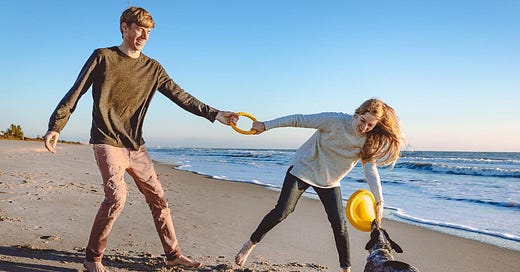Reasons we play with our dog “just to play”
Featured photo credit to the very talented Saint Paisley Photography
When I started looking at play with Scout as more than just a reward in training—as a social, relationship-building experience, not merely a transaction—our lives transformed for the better.
Play resources like Jay Jack and Ivan Balabanov have revolutionized the way I interact with my dog. We laugh and growl and pull like crazy during tug of war. We’ve learned to enjoy purely cooperative games like chase and catch. Most of all, we’re just plain happier.
Here’s why we love to play for its own sake:
Play is fun!
At the end of the day, I got a dog to have fun with her. I want to build a relationship where both of our lives are enriched because we share them.
It’s biologically fulfilling
Play fulfills us both. Importantly, it satisfies my cattle dog’s natural instincts in a way that’s safe and appropriate in our modern, human-centric world.
Play helps us connect with each other
Play allows me to connect with my dog as a fellow creature, not just a source of reinforcement and punishment. This makes our relationship even more profound.
It produces positive chemicals in the brain
Play releases dopamine, serotonin, and oxytocin. These not only make us feel great but also also encourage a deeper bond in the long run.
Play reduces stress
Play helps us relieve and recover from stress, particularly after difficult situations (like getting ambushed by an apartment neighbor’s off-leash dog in our building’s shared hallway).
We learn through games
Through play, we can naturally teach our dogs valuable skills like impulse control and emotional regulation.
What’s more—play is associated with brain responses that facilitate learning. One of these is activating the neurotransmitter norepinephrine, which can improve brain plasticity.
It’s good for our health
Play might be an indicator of health or resistance to stress. Basically, however you look at it, seeing our dogs in a state where they are able to play is a good thing!
Where to learn more about play
The science-y tidbits here are thanks to Dr. Sam Wang and Dr. Sandra Aamodt in the adapted article “Play, Stress, and the Learning Brain”. I’ve also learned a lot about playing with dogs specifically from trainers like Ivan Balabanov, Jay Jack, and more outlined in this article on play resources.
Anecdotally, it’s been clear to see how play has improved Scout’s quality of life. The more I research beyond personal experience, the stronger I feel that sentiment!





